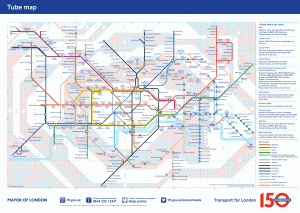I’ve been waiting for ages for the paperback of George Dyson’s [amazon_link id=”014101590X” target=”_blank” ]Turing’s Cathedral: The Origins of the Digital Universe[/amazon_link], and a couple of chapters in am already *loving* it. It’s the kind of book that stuffs in all sorts of information, well suited to a magpie mind like mine. For example, did you know that Francis Bacon knew in 1623 that two symbols sufficed to represent all information? “A man may exprese and signifie the intentions of his mind, at any distance of place, by objects … capable of a two-fold difference onely.” Turing of course formalized this in his 1936 paper. He noted: “Being digital should be of more interest than being electronic.” The electronics distracted us, however. Dyson follows this section with a diversion into the history of the site of Princeton’s Institute for Advanced Study during the Revolutionary War. Perfect.
[amazon_image id=”014101590X” link=”true” target=”_blank” size=”medium” ]Turing’s Cathedral: The Origins of the Digital Universe (Penguin Press Science)[/amazon_image]
Coincidentally, I was reading bits of and about Bacon’s [amazon_link id=”1440042500″ target=”_blank” ]Novum Organum[/amazon_link] recently, particularly about his notion of myths that distract us from scientific knowledge. The key myth or ‘idol’ he labels ‘Idols of the Market Place’: “Men associate through conversation, but words are applied according to the capacity of ordinary people. Therefore shoddy and inept application of words lays siege to the intellect in wondrous ways.” This was for my presentation at The Story 2013, in which I talked about the usefulness of models and equations, rather then verbal narratives, for describing aspects of the world. After all – as Margaret Bray and others have pointed out – the London Underground map is a useful model, not an accurate representation of London’s geography.
[amazon_image id=”1176418432″ link=”true” target=”_blank” size=”medium” ]Novum Organum[/amazon_image]

A useful model
Robots have been on my mind anyway, having been thinking about Luddites and jobs. This book, [amazon_link id=”1448659817″ target=”_blank” ]The Lights in the Tunnel[/amazon_link] by Martin Ford, looks rather interesting, from this extract from the introduction. I couldn’t agree more with this statement: “The evidence is pretty clear: a race between technology and our ability to reform our political and economic systems is really no race at all. So if we can foresee that technology is likely to have a highly disruptive impact on our economy in the coming years and decades, then we really need to start thinking about that well in advance.“
[amazon_image id=”1448659817″ link=”true” target=”_blank” size=”medium” ]The Lights in the Tunnel: Automation, Accelerating Technology and the Economy of the Future: 1[/amazon_image]

Pingback: Digital origins and robotic futures | Fifth Estate